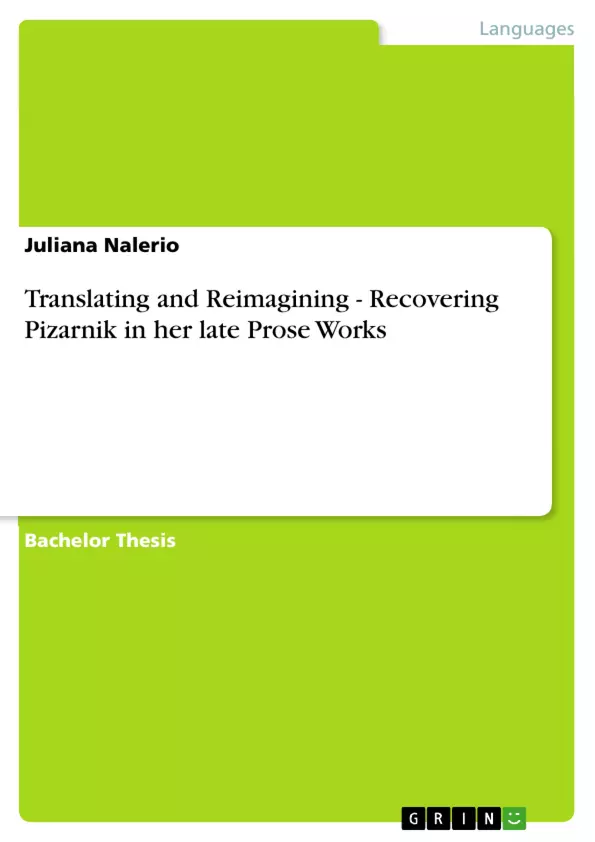This senior thesis thesis examines the authorial image of Argentine-Jewish poet, Alejandra Pizarnik (1936-1972). Long thought of as a modern poet with minimal connection to any one tradition, I re-imagine her as a poet of Judaism, language and childhood through close readings of works, many poemas en prosa, written late in her life and after her father’s death. This thesis has three chapters: (1) Images of the Artist; (2) New Readings of Pizarnik (Prose) Poems; and (3) Translating Pizarnik (Prose) Poems. In the first chapter I examine notions of Pizarnik created by critics and by the public, then move to re-imagining her as a poet in a new lens. In chapter 2, close-readings of prose poems substantiate those claims made in my re-imagining. Finally, chapter 3 provides annotated translations of five poems, four previously untranslated—Los muertos y la lluvia (The Dead and the Rain), Dificultades barrocas (Baroque Difficulties), Desconfianza (Distrust), Devoción (Devotion), and the only poem in verse, Poema para el padre (Poem for my Father). My interpretation of Pizarnik is influenced by concepts including, J. Lacan’s ‘desire,’ Bachelard’s 'poetics of internal space,’ Turner’s 'liminality,’ and Borges’ 'infidelity in translation,’ amongst others. Ultimately, I hope this reading of the complicated poet succeeds in recovering essential aspects of her cuerpo poetico (poetic body of work).
Inhaltsverzeichnis (Table of Contents)
- Images of the Artist: Alejandra Pizarnik
- Introduction
- Existing Popular and Critical Images of Alejandra Pizarnik
- Reimagining Alejandra Pizarnik
- New Readings of Pizarnik (Prose) Poems
- The Jewish Question
- Language
- Childhood
- Translating Pizarnik (Prose) Poems
- Introduction
- Los muertos y la lluvia / The Dead and the Rain
- Dificultades barrocas / Baroque Difficulties
- Desconfianza / Distrust
- Devoción/Devotion
- Poema para el padre / Poem for my Father
Zielsetzung und Themenschwerpunkte (Objectives and Key Themes)
This thesis aims to re-imagine Alejandra Pizarnik, an Argentine-Jewish poet, through a closer examination of her prose poems, focusing on themes of Judaism, language, and childhood. This thesis re-evaluates Pizarnik's work through the lens of these themes, drawing upon concepts from prominent thinkers such as J. Lacan, Bachelard, Turner, and Borges. The key themes explored in this thesis include:- Reclaiming Pizarnik's Jewish identity
- The role of language in Pizarnik's poetry
- The significance of childhood experiences in her work
- The impact of her father's death on her poetry
- The process of translating Pizarnik's prose poems
Zusammenfassung der Kapitel (Chapter Summaries)
The first chapter focuses on existing popular and critical images of Pizarnik, highlighting how her work has been interpreted by critics and the public. It then proposes a new perspective on her work, re-imagining her as a poet of Judaism, language, and childhood. Chapter two delves into close readings of Pizarnik's prose poems, providing evidence for the re-imagining presented in the first chapter. This chapter examines the Jewish question in Pizarnik's work, exploring its relationship to language and childhood. Chapter three explores the translation of Pizarnik's prose poems, presenting annotated translations of five poems, including one previously untranslated work, "Poema para el padre" (Poem for my Father). This chapter examines the challenges and rewards of translating Pizarnik's unique style and themes.Schlüsselwörter (Keywords)
This thesis delves into the world of Alejandra Pizarnik, exploring her prose poems through the lens of Judaism, language, and childhood. Key concepts such as Lacan's "desire," Bachelard's "poetics of internal space," Turner's "liminality," and Borges' "infidelity in translation" inform the analysis of her work. Through close readings and annotated translations, this thesis seeks to recover essential aspects of Pizarnik's poetic body of work, offering a fresh perspective on a complex and compelling artist.- Quote paper
- Juliana Nalerio (Author), 2011, Translating and Reimagining - Recovering Pizarnik in her late Prose Works, Munich, GRIN Verlag, https://www.grin.com/document/196285



